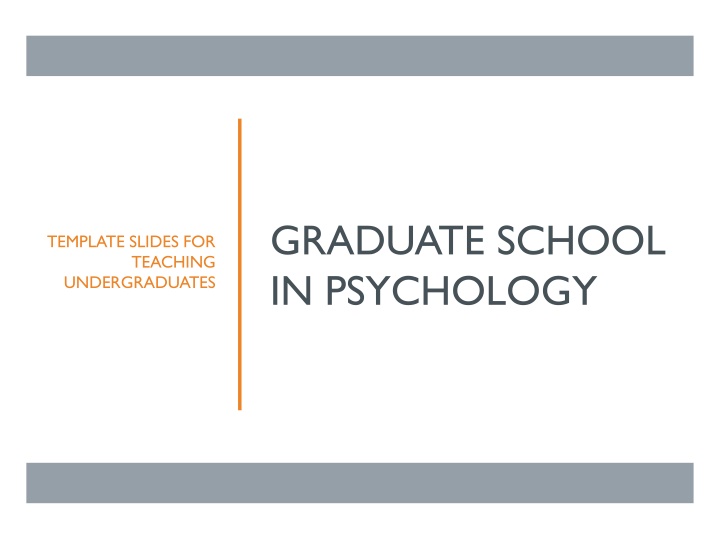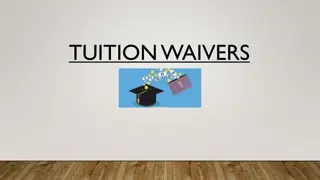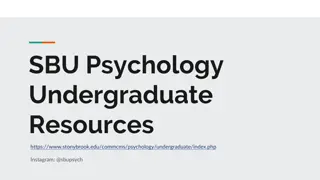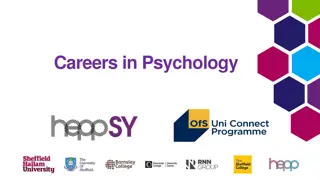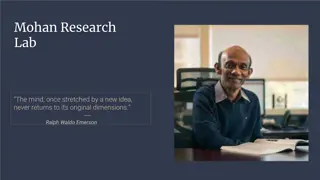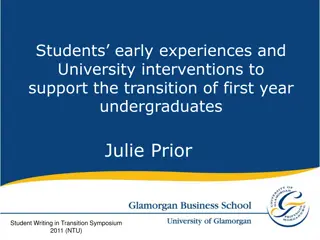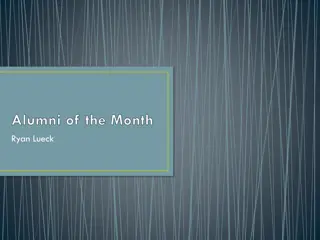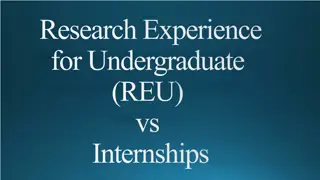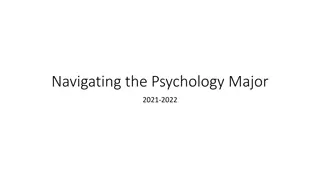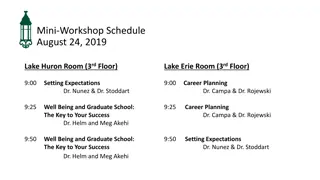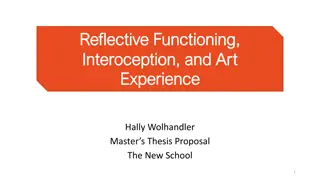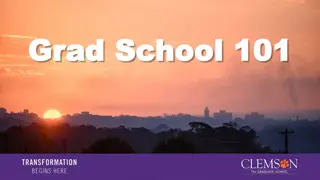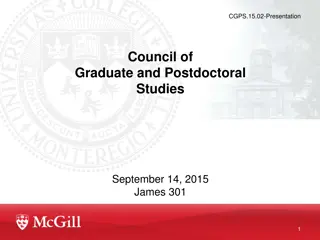Graduate School in Psychology: Teaching Undergraduates
Resources on graduate programs in Psychology aimed at educating undergraduates about career opportunities, program types, funding options, and why to consider further studies in psychology. Discover paths in personality psychology, skills training, therapy, and research to enhance your career prospects
Download Presentation

Please find below an Image/Link to download the presentation.
The content on the website is provided AS IS for your information and personal use only. It may not be sold, licensed, or shared on other websites without obtaining consent from the author.If you encounter any issues during the download, it is possible that the publisher has removed the file from their server.
You are allowed to download the files provided on this website for personal or commercial use, subject to the condition that they are used lawfully. All files are the property of their respective owners.
The content on the website is provided AS IS for your information and personal use only. It may not be sold, licensed, or shared on other websites without obtaining consent from the author.
E N D
Presentation Transcript
GRADUATE SCHOOL IN PSYCHOLOGY TEMPLATE SLIDES FOR TEACHING UNDERGRADUATES
FACULTY: HOW TO USE THIS MATERIAL Consider hosting a workshop at your home institution about graduate programs in Psychology. Many undergraduate students, especially first-generation students, are unaware of the various careers in psychology one can pursue with an advanced degrees. Students are also generally unaware of the different types of graduate programs and degrees. Finally, many do not know that some programs, like Ph.D. granting programs, are generally fully-funded. This is a platform to recruit more students to personality psychology! Alternatively, post these slides to your course website. Interested students can view at their leisure.
STUDENTS: HOW TO USE THIS MATERIAL The resources we provide here are focused on graduate school in Psychology within the United States. Some information may be applicable to your situation depending on the country you wish to pursue graduate studies in. e.g., programs in Canada may be more like those in the U.S. than to programs in Europe. Use this material as a set of guidelines, rather than a set of hard and fast rules. It s important to factor in your specific circumstances, identities, and goals when deciding on if and how to pursue graduate studies. We hope you can use these resources in conversation with your peers, professors, and other mentors!
I WANT TO LEARN MORE ABOUT Why I should consider graduate school How to apply to graduate school Financing my graduate education
WHY GO TO GRADUATE SCHOOL?
Personality psychologists can be found in many places. You can find us... Treating patients with personality disorders. Developing tests to help high school students identify potential careers. Analyzing data for the US government and the private sector. Improving people s experiences with social media. Teaching undergraduate and graduate students. WHAT CAN I DO WITH A BACKGROUND IN PERSONALITY SCIENCE?
Training in specific skills Therapy Research design, data analysis Teaching WHY GO TO GRADUATE SCHOOL? Preparation for licensing exams Necessary for clinical work Networking and professional development Learn more about the career(s) you are interested in and make contacts with people in those careers
SHOULD I APPLY TO GRADUATE PROGRAMS? Consider your career goals. A good career goal describes your values and preferences, not a specific job. I want to work with children struggling with mental health problems, not, I want to be a psychologist. Why? You ll miss out on lots of jobs that might be a better fit for you. It s possible you don t have a great sense of what a specific job entails.
WHATS YOUR CAREER GOAL? Therapy, working with clients Consider pursuing degrees in Counseling, School, or Community Psychology, or a degree in Social Work or Education. You ll most likely want to look for Master s programs. These degrees vary in cost, but the programs are relatively short (2-3 year). The end of this presentation discusses financing your graduate education. Psychiatrists work at the intersection of medicine and therapy. This requires a medical degree, meaning medical school. The degree is generally more expensive, and it takes longer to complete, but psychiatrists also tend to have higher incomes. Mitch Prinstein has some good advice about these routes.
WHATS YOUR CAREER GOAL? Research, studying people, working with data You re likely a good fit for a Ph.D., which is a research-oriented degree. Ph.D. programs are generally fully-funded and many come with a (small) stipend, so students do not need to take on additional work while pursuing their degree. A few words of caution: Doing research is different from learning. You may enjoy learning but not doing research. For those interested in becoming professors, know that the academic job market has been getting worse over recent decades. Not every program or advisor will be equipped to help you get a job outside of academia You ll want to narrow down your focus of study before identifying potential advisors and programs.
WHATS YOUR CAREER GOAL? Being a professor. What draws you to this career? What aspects of scientific study are most interesting to you How well do you understand the day-to-day life of your professors? Do you think you would enjoy traveling, grant writing, mentoring, teaching, data analysis, editing, public speaking, writing, and administrative work? Are you willing / able to make several moves over your career? What does good work-life balance look like for you? For those interested in science, MyIDP can help you clarify your values and goals and match you with appropriate jobs.
WHAT IS GRADUATE SCHOOL LIKE? For research-focused programs (Ph.D and some Masters): Training in research and data science Most work is outside the classroom Apprenticeship model Graduate student is more like an entry-level position in a career, rather than being a student For clinical-focused programs (Masters and Psy.D.): Coursework is more important Experience gained through internships and practicums This presentation is mainly focused on research- focused programs!
APPLYING TO GRADUATE SCHOOL Source:Dr Rodica Damian, University of Houston
2-3 years before applying (~ sophomore year) Build a strong GPA Join a lab Build professional relationships with Professors START PLANNING EARLY 1-2 years before applying (~ junior year) Gain research experience Research graduate programs Take GRE Summer and fall of application season (~ senior year) Ask for letters of recommendation early in the year Submit applications
You can continue your F-1 status and get one year of optional practical training. You can use the practical training either before or after grad school but choose wisely. Consult with your international students office to get the latest advice because laws change. FOR INTERNATIONAL STUDENTS After you get accepted to a grad program, contact the international student office at that school for more information. Most graduate financial aid is unrestricted-- international students are eligible.
SELECT PROGRAMS Select schools Department, not university rankings matter Select about 15-20 potential programs based on their match with your academic record, research experience, research interests, and career goals For PhDs, the faculty mentor is one of the most important things to consider. Most departments use an apprenticeship model Your mentor will be responsible for most of your training, research productivity, and professional development. Good fit (both in terms of research and personality) is essential.
Identify professors who share your research interests Check their websites, and look to see if they mention their mentoring philosophies and/or lab values Read journal articles they authored SELECT PROGRAMS: FINDING AN ADVISOR AT THE PROSPECTIVE SCHOOL Identify programs where your research interests are compatible with 2-3 potential mentors, which will boost your likelihood of attracting interest from at least one of them. Contact potential mentors to verify they are accepting a new student during the next application cycle. Narrow down your list with the goal of applying to around 8-12 schools. Depending on your resources, you may want to apply to a range of schools (e.g., less selective highly selective schools).
APPLICATION REQUIREMENTS GPA* GRE Tests** Research Experience CV/ Resume Personal Statement Recommendation Letters The Interview Even if you do not meet GPA requirements for the program, it is worth reaching out to the potential advisor to see if this is a hard requirement. The GRE is not always a requirement for applications, so be sure to check the specific program requirement.
GPA You will need to send official transcripts to each school you apply to. The better your grades, the better your chances, but exceptions apply, and you do not need perfect grades. Other aspects of your package may be more important. Optional steps to make your application stellar: Good grades in methods and statistics courses. Expertise in open source statistical programs like R. There are excellent and free resources online for teaching yourself this program.
GRADUATE RECORD EXAMINATION (GRE) Take the exam the summer before you apply. Don t forget to prepare. Keep the price tag in mind: The exam costs $205 to take. Sending official scores to schools often includes additional fees. The GRE offers a free practice test. Test-prep books (see Kaplan and ETS) are excellent, range from $30-$60. Don t wait until the last minute. Scores can take up to 6 weeks to process. Look online for free vocabulary flash cards. Look into the GRE Fee Reduction Program for financial assistance. Some programs also require subject GREs. Scores are good for 5 years. Take it even if you re considering waiting a year or two to apply to graduate school: Ask potential programs if they can accept unofficial scores -- some do and only require your official scores if you ve been accepted to the program. These are additional exams specific to subject matter, like Psychology. Make sure you know whether your program requires this and factor in the cost of taking and preparing for this exam as well.
PRIOR RESEARCH EXPERIENCE IS HIGHLY VALUED Work in the research labs at your university You can contact professors to ask about available positions. Some spots are paid but most are voluntary or for course credit. Ask about work-study options. When working in research labs, show initiative, get involved with research projects. You can also work over the summer or work full-time as a research assistant between undergraduate and graduate school. Write a senior honors thesis Check the Psychology department website of your university to see the requirements and timeline.
PERSONAL STATEMENT Read each school s prompt carefully. Tailor the statement to the program and advisor you re applying to. Use a worksheet to prepare your statement. Some examples: UCAS Personal Statement Worksheet Amherst College - Writing Your Personal Statement Old Dominion - Writing an Effective Personal Statement Consider using a book as a guide to crafting the best possible statement. Example: Donald Asher s Graduate Admissions Essays
If its possible, consider how each letter writer can offer different insights into your abilities, talents, and who you are as a person You will need at least 3 letters from university professors Select people who know you (ideally you have worked in their research labs/ clinical practice for at least 2 months) When to ask The sooner the better Send gentle reminder email to check in 2 weeks before each deadline RECOMMENDATION LETTERS What to include when asking for a recommendation Prepare a folder of all your info for each writer Resume/CV, Transcript/Courses taken with grades Personal Statement (so they can match their letter with your interests/goals as much as possible) Spreadsheet of all the schools, deadlines, what to include, how to submit (email, online, return to student, etc.) Pre-addressed/Stamped envelopes for those that need to be snail mailed (hopefully none will be needed, very rare)
INTERVIEWS If your written application is successful, you may be invited to an interview. May be after you ve received an offer. May be just the next step in the application process. Interviews are always 2-way streets: this is an opportunity for you to decide whether the program is right for you.
Pay attention to your body language / eye contact. Every interaction is important! Showing respect towards every person you meet can go a long way. Bring questions and always be prepared to ask them, but don t forget to take turns in any conversation Know the answers to questions about your interests, motivations, goals, abilities and experience INTERVIEWS: PUT YOUR BEST FOOT FORWARD Try to know who you will be meeting with ahead of time. Spend some time doing a deep dive on the program prior to your interviews. Google interview tips & sample interview questions Dress professionally, but make sure you feel comfortable spending the entire day in the outfit you choose Take bathroom breaks when they are offered, even if it s just to have some down time to collect your thoughts Be yourself! Being a little nervous is okay and expected. It shows that you re excited about the possibility of attending the program.
Learn everything you can about the success and well- being of current students. Ask current students what they like and dislike, what issues have come up in the past, how those issues have been resolved. INTERVIEWS: USE THE OPPORTUNITY TO LEARN MORE How long do students typically spend in the program? Are students successful at finding jobs after graduation? In what kinds of careers? What opportunities for training or development are unique to this program? Keep your well-being in mind. Will you be comfortable living in this city for 2-6 years? Will you feel safe? It s ok to consider constraints on location, especially if you re responsible for other people.
ACCEPTANCE If you are accepted: How long do I have to decide? Standard deadline: April 15 Notify programs where you interviewed of offers from other programs. Do not feel pressured to accept an offer early if you may have other options; do not accept any offer immediately. But be courteous once you know your decision, let programs know so they can reach out to their waitlist. If you are not accepted: Reassess Were you a good fit for these programs? If no, why not? Consider reaching out to interviewers for feedback. Gain more research experience; consider a Master s degree.
FINANCING YOUR GRADUATE EDUCATION Source: Dr Christiane Spitzmueller, University of Houston
PhD programs tend to be 100% funded But salaries (called stipends) and other benefits (e.g., healthcare) vary across schools BASICS MA programs tend to be unfunded--you have to fund yourself But there are some exceptions, e.g., College of William and Mary, Wake Forest, Villanova And see following slides for ways to fund yourself Look carefully at each school s website
LOANS Federal Graduate can help cover the cost of higher education. Two types of federal loans (along with private loan options) Direct Unsubsidized Loan Graduate students are NOT eligible for subsidized loan (US Dept. of Education pays interest while you are in school at least half time). No need to demonstrate financial need Interest will accrue (Fixed rate is 6.6%) Limit on annual and cumulative loan amount Direct PLUS Loans Loans to eligible graduate students through schools participating in the Direct Loan Program Must not have an adverse credit history A parent can cosign for the loan Fixed interest rate is 7.6% You can borrow up to cost of attendance Private loans through lending institutions (e.g., banks and credit unions) https://studentaid.ed.gov/sa/types/loans https://mastersinpsychologyguide.com/articles/financial-assistance/
LOAN REPAYMENT OPTIONS Psychologists can earn loan forgiveness (for Direct Loans only) under the following qualifications: You are required to make 120 payments, which must be on time, according to the schedule set out in your Direct Loans. You must make those payments under a repayment plan that qualifies for student loan forgiveness. You must work full-time at a qualifying public service institution at the time that you make all your payments National Health Service Corps Loan repayment Plan Administered by the Bureau of Health Workforce (BHW) in the Health Resources and Services Administration (HRSA) of the U.S. Dept. of Health and Human Services (HHS) Serve two full years at a qualifying practice, in which case the NHSC will pay up to $50,000 toward your student loans, or Serve two half-time years at a qualifying practice, in which case the NHSC will pay up to $25,000 toward your student loans https://mastersinpsychologyguide.com/articles/financial-assistance/
SCHOLARSHIPS Click here to learn more about scholarships for: Numerous scholarships you can apply for that offer financial support that do not need to be paid back Underrepresented minorities Scholarships through Psi Chi Allyn and Bacon Award for empirical research paper (Prizes of $1,000, $650, and $350) Diversity Article awards on topics of diversity issues (Four awards of $300) Women LGBTQ persons Irwin L. Goldstein Scholarship and the Benjamin Schneider Scholarship For minority doctoral student in I-O psychology Veterans APF Graduate Student Scholarships General scholarship for graduate students in psychology George C. Thornton, III Graduate Scholarship Supports doctoral student in I/O psychology Scott and Paul Pearsall Grant Supports graduate students who seek to increase understanding of psychological pain and stigma experience by adults with visible physical disabilities
National Programs That Offer GRE Fee Reductions and Grad Program Assistance: PRE- APPLICATION: PROGRAMS THAT OFFER FINANCIAL SUPPORT Gates Millennium Scholars Program Gates Millennium Scholars program: Founded by Bill Gates foundation Scholarship program for incoming freshman students of color entering college, however, if you are one of these recipients and continue onto grad school, you are eligible for a GRE fee reduction and Gates Millennium Fellowship in a graduate degree program Veteran s Affairs For past and present Servicemembers, and their families
Timing of first payment? Some institutions may not pay you until you have been in school for 1-2 months. Health insurance Some institutions may allow you to choose a special faculty insurance or may offer special graduate insurance rates. Plan on getting a Master s degree first? I HAVE OFFERS! WHAT SHOULD I CONSIDER, FINANCIALLY? Some students decide this is a great option to boost their CV and experience. Ask potential PhD and PsyD programs if they will honor courses taken elsewhere. Some institutions will allow undergraduates to take graduate level courses prior to enrolling in the MA program. Can I work while enrolled? Most PhD and PsyD programs disallow working during enrollment due to the workload. Some Master s programs may be ok with this, but careful consideration of your personal timeline, finances, and workload must inform this decision.
Thank you to Drs. Candice Alfano, Rodica Damian, and Christiane Spitzmueller for allowing us to adapt their slides. THANK YOU FOR WATCHING/ READING! These slides were created, edited, and formatted by Drs. Robert Latzman, Chris Martin, Nicole Lawless DesJardins, Sara Weston, and Joanne Chung.
The National Association of School Psychologists Education and Research Trust American Association of University Women International Fellowships For women who are not US citizens or permanent residents APA Mental Health and Substance Abuse Services Fellowship For those pursuing doctoral degrees in various mental health services areas to promote culturally competent mental health and substance abuse services SCHOLARSHIPS FOR UNDERREPRESENTED MINORITIES Filipino-American Psychology Scholarship To increase the number of Filipino-American professors, researchers, and academics in the field of psychology Mental Health Dissertation Research Grant to Increase Diversity qualified doctoral candidates from underrepresented groups, with disabilities or from disadvantaged backgrounds Zeta Phi Beta Sorority General Graduate Fellowships For African-American graduate women who are working on professional degrees, master's degrees, doctoral, or post-doctoral studies.
Carol Williams-Nickelson Award for Womens Leadership For women currently pursuing a doctorate in psychology with research focused on women s issues Career Advancement Scholarship Variable scholarship awarded to undergraduate women currently studying psychology Nancy B. Forest and L. Michael Honaker Master s Grant for Research in Psychology SCHOLARSHIPS FOR WOMEN Open to women conducting Master s thesis research in psychology Woodrow Wilson Dissertation Fellowship in Women s Studies Pioneer Graduate Student Award For Asian Pacific feminist graduate student who seeks to develop and advance feminist understanding of the psychology of Asian Pacific American women. Psychology of Black Graduate Student Women Award American Association of University Women Career Development Grant Support women who are preparing to attain a Master s degree
Point Foundation LGBT Scholarships Point Foundation provides scholarships, mentorship, leadership training and hope for undergraduate and graduate students of merit who have been marginalized due to sexual orientation, gender identity or gender expression. Bisexual Foundation Scholarship Award Select graduate students who advance research on the psychology of bisexuality SCHOLARSHIPS FOR LGBTQ PERSONS Malyon Smith Scholarship Research Award Graduate students who advance research on sexual orientation and gender identity Transgender Research Award Open to anyone conducting psychological research using trans participants or studying issues affecting trans people and communities. Roy Scriver Memorial Research Grants For empirical and applied research focused on lesbian, gay and bisexual family psychology and lesbian, gay and bisexual and transgender family therapy
Post 9/11 GI Bill Helps with tuition and fees, housing, books and supplies, money to help move Fry Scholarship If a parent or spouse was an active-duty Servicemember who died in the line of duty on or after 9/11. Includes money for tuition, housing, books and supplies Survivors and Dependents Educational Assistance Program For children or spouses of a Veteran or Servicemember who has died, is captured or missing, or has disabilities. SCHOLARSHIPS FOR VETERANS Veterans United Foundation Scholarship Army Women s Foundation Legacy Scholarship program Navy Wives Club of America (NWCA) Mary Paolizzi Member s Scholarship NWCA members who are college graduates or undergraduate seniors who expect to enter graduate school in the upcoming year Iraq and Afghanistan Service Grant If parent or guardian died as result of military service in Iraq or Afghanistan
LINKS AND RESOURCES GRE Fees: https://www.ets.org/gre/revised_general/about/fees/ 2018 Graduate Study in Psychology Summary Report: https://www.apa.org/education/grad/survey-data/2018-admissions-applications Data on PhD Stipends by University: http://www.phdstipends.com/ Sources of Funding: https://www.apa.org/education/grad/funding Affording and Repaying Grad School: https://www.apa.org/apags/resources/affording-repaying Affordable Debt Calculator: https://www.consumerfinance.gov/paying-for-college/your-financial- path-to-graduation/
LINKS AND RESOURCES https://studentaid.ed.gov/sa/types/loans https://mastersinpsychologyguide.com/articles/financial-assistance/ https://www.apa.org/about/awards/index https://www.grants.gov/ http://www.collegescholarships.org/grants/graduate.htm http://foundationcenter.org/products/foundation-grants-to-individuals-online https://mappingyourfuture.org/ https://going2college.org/StateResources/OrganizationList.cfm https://explore.va.gov/education-training/scholarships-grants https://www.gograd.org/financial-aid/scholarships/military-veterans/ https://studentaid.ed.gov/sa/types/grants-scholarships/iraq-afghanistan-service https://www.nasponline.org/membership-and-community/awards-scholarships-and- grants/minority-scholarship-program https://nhsc.hrsa.gov/downloads/loan-repayment/nhsc-LRP-application-program-guidance.pdf
